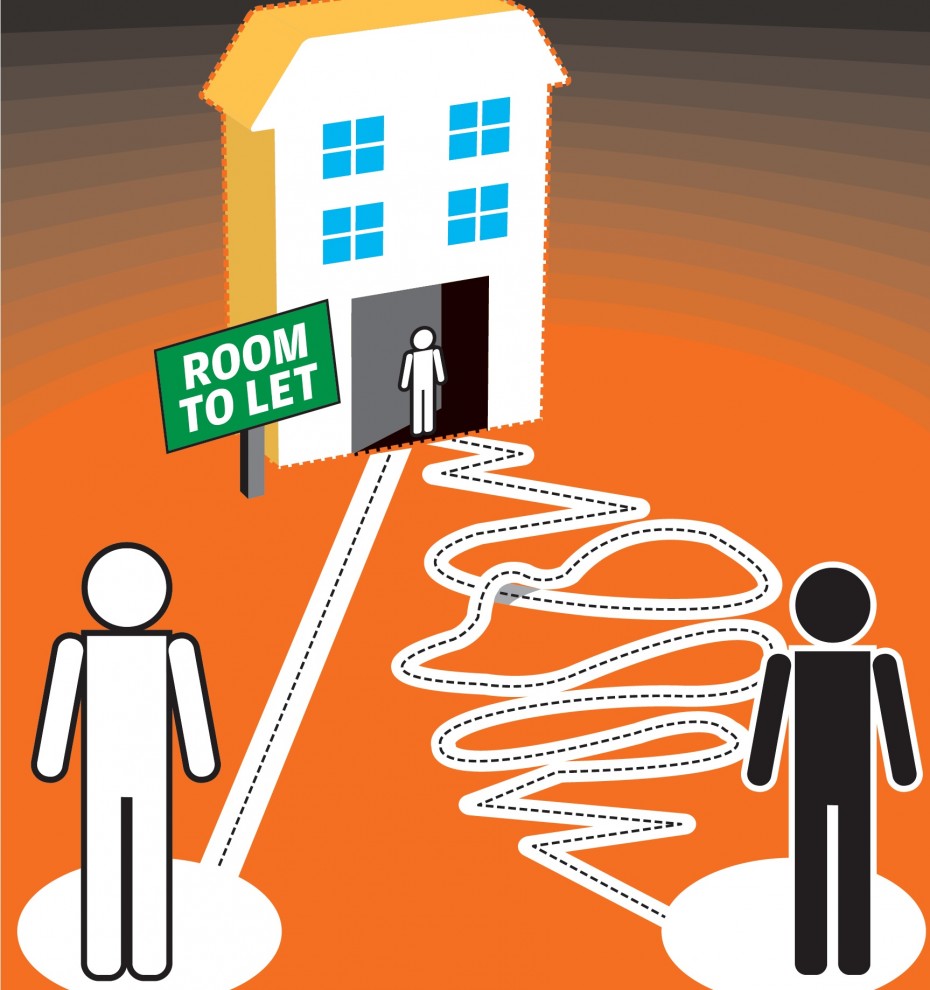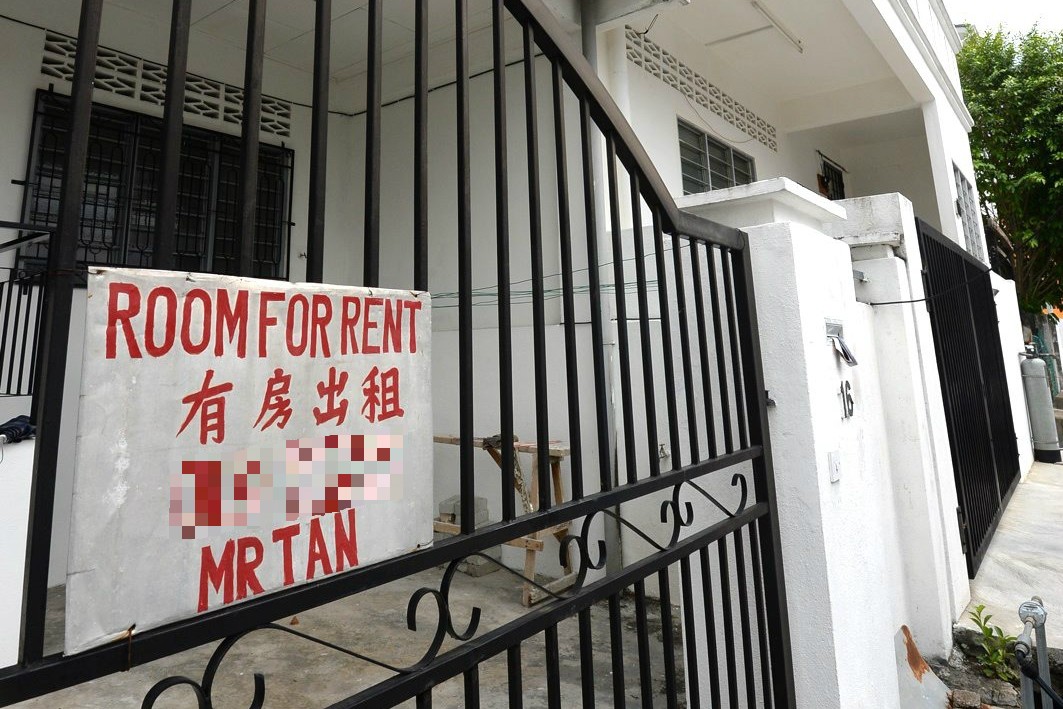Story by CLARISSA SAY and ABIRAMI DURAI
ROOM hunting during your undergraduate years is hard enough as it is.
Most students find themselves picking their way through a minefield of poor plumbing, lousy locations, misleading images and opportunistic realtors. But add racial discrimination to the mix and a whole lot of Malaysian students are suddenly finding themselves laden with an extra set of difficulties.
All it takes is a cursory glance at any Malaysian property site to see what’s wrong with the picture – close to 50% of the first 100 ads for Selangor properties on a local room rental website stated a specific racial preference. On classifieds websites, the number is over 70%.

Students of certain races and nationalities are having a much tougher time finding rooms to rent in Malaysia.
‘[Specific race] only’
Just ask Ezriann Charanya, 20, a student at Universiti Tunku Abdul Rahman who nearly found herself without a place to stay.
“It took me five months to find a new place, which is astonishing because I had a four-month head start before I had to move out of my previous home,” said Ezriann, who is currently staying in Wangsa Maju.
The best response I got was ‘I’m not racist but we only want Chinese tenants.’”
“It was the same process over and over – I went to the property sites, filtered locations, skimmed past the ads that specified racial preferences, read the ones with no preference only to find out they stuck in a sneaky little line about which ethnic group they were willing to rent to.”
“Also, there were some ads that didn’t indicate a preference – until I called. The best response I got was ‘I’m not racist but we only want Chinese tenants.’”
Ezriann isn’t the only one to have experienced this, but she represents a wave of young Malaysians who are getting fed up of having to deal with the stereotypes.
“Some of the homeowners said it was because they were afraid the Indian cooking would stain the walls and carpets, or that my prayers would disrupt the other tenants. I told them that I didn’t do any of that, but the answer was still ‘No.’ I felt robbed,” she said. “Because I had the means to pay, I was often one of the first few to call and yet I got passed over because of the colour of my skin!”
Another student, Dharshini Shanker, 20, says this sort of conduct isn’t uncommon when looking for rooms to rent.

Dharshini’s brush with racist rental ads hasn’t dented her spirit, and she still thinks people are entitled to their own opinions, so long as they don’t hurt other people.
“Most of the ads I encountered when trying to find a place usually had some sort of specification like, ‘Only for Chinese females’. And if I said I was Indian, rejection always followed.”
Mass Communications student Tania Jillian Joseph, 21, can empathise with Dharshini’s predicament.
Of Portuguese-Chinese descent, Joseph actually had to bring her Oriental mother with her on room-hunting expeditions, as many of the homeowners who had a ‘Chinese only’ stipulation refused to believe that she had Chinese blood!
“I was turned down numerous times because I wasn’t pure Chinese,” she said disbelievingly.
Abroad and alone
Things are worse for international students, like Mwamba Chisanga, 22, from Switzerland, and Dipo Emmanuel, 24, from Nigeria.
It would be laughable if it weren’t so sad that something as thin as a layer of skin should stand in the way of two well-educated, well-spoken young men. Dipo found this out the hard way.
“It took me almost a year before I was able to get an apartment,” he says. “I went through countless houses but as soon as the homeowner heard that I was African, vacancies would magically fill themselves up.”
Even Mwamba, who speaks in perfectly intoned English, found himself at a dead end after meeting realtors.
“I picked up the phone numerous times, calling agent after agent. I visited the places they had to offer, met the owners … ” Everything seemed fine until he tried to contact the agents afterwards. His calls went unanswered, texts un-replied, it was as if the agents had fallen off the face of the earth.
While this is not the experience of all international students, Ravi (not his real name), a Sri Lankan undergraduate at Monash University Malaysia, thinks that most international students of colour face racial discrimination, with students from the African continent suffering the bulk of the prejudice. Ravi said:
I have an African friend who used to live in my condominium, but he left after the management forbade him from using the swimming pool and other facilities in the condo
This extreme bigotry towards Africans is not isolated.
In August of 2013, residents of Ridzuan Condominium in Bandar Sri Subang actually voted to completely ban Africans from renting units in the building, citing the fact that they “caused a lot of nuisance” as one of the reasons for the edict.
Siva Shanker, the President of the Malaysian Institute of Estate Agents (the body that represents all registered estate agents in Malaysia) agrees that students of African origin are at a disadvantage in this situation.

Siva Shanker says that even real estate agents sometimes have to grit their teeth and bear with racially-motivated clients, whether they like it or not.
“I think the perception is that African students don’t end up paying their rent and are constantly up to no good. The Nigerian fraud schemes and news reports about Africans behaving badly have only added fuel to the fire. It’s sad but in this instance, the actions of a few have tarnished the image of many.”
A silent battle
Still, not all students in this position find it a major issue.
Sandhya Prem, a 19-year-old pre-med student at Taylors Subang says that whilst racism in rental practices is an inconvenience, it isn’t a particularly debilitating one. She said:
Well, it is an annoyance to be sure, but honestly I think there are much more prevalent issues of racism in Malaysia.”
Perhaps because most students share Sandhya’s sentiments about picking their battles, there hasn’t been much brouhaha about the apparent unfairness of the situation.
Another reason the issue may be marginalised is because the student population seems to be split between those who face discrimination, those who don’t face it and a third category that isn’t even aware it happens because it doesn’t affect them.
Fabian Chan, 22, a chemical engineering student is one of the lucky ones who has never had a problem finding a place to say.
“Most of the tenants in my condo are Malaysian Chinese and Indonesian Chinese. I’ve seen those ads that say ‘only Malaysian Chinese’, but I guess because I’m Chinese, I haven’t been turned down before,” he said.
There are also students like Mass Communications scholar Aimee Choon, 20, who hadn’t even known the issue existed.
Choon, who lives with her parents, said, “Before you brought the matter up, I’d never heard of it. I don’t really think it’s a major issue. Or at least that cases where it happens are the exceptions rather than the norm.”
Are these cases really the exceptions?
Siva Shanker has dealt with many homeowners over the years and says that racial profiling is relatively common in rental practices.
“Are homeowners justified in their preferences? Not really, because sometimes they take one bad experience with a particular race and then generalise it, so everyone gets tarred with the same brush.”
Because estate agents are often the first point of contact for students making enquiries, they are also the ones who get cast in a negative light. But Shanker is adamant that estate agents are themselves not guilty of racial preferences; they are simply acting on their clients’ whims.
Estate agents are really the middlemen – our job is to sell and rent and do whatever the client tells us.
— Siva Shanker, President of the Malaysian Institute of Estate Agents
This brings to light an interesting question: should estate agents, who often act as intermediaries between clients and potential tenants, be doing more to take a stand against clients who practise racial discrimination?
Shanker, for one, is doing just that.
“Because I am more established in the industry, I can turn to potential clients and say, ‘You’re a racist and I don’t want to deal with you.’”
However, he agrees that younger estate agents cutting their teeth in the property market don’t have the same luxury.
“When they’re just starting out, they have to take whichever client comes to them, whether they’re racist or not. They are not in a position to turn down work.”
Nurul Asmui Md Azmi, 27, the web editor of rental database site iBilik.my, has also noticed – in the course of moderating the website – that most homeowners prefer to rent to their own race.
“I don’t think people are trying to be spiteful, it’s mostly to do with the commonalities that they share.
For example, most Malay Muslims would prefer to live with someone of the same faith who understands the religious and culinary restrictions involved – it just seems more convenient that way, for both owner and tenant.”
Homeowners and racial preferences
Some of my Chinese clients in the area won’t rent out to Chinese nationals either! I’ve heard of a few cases where Chinese nationals rented high-end condos here and turned them into ‘semi-commercial’ lots, or even hubs for illegal activity.
Why do homeowners have racial preferences? It’s a loaded question and one that Felix, a 35-year-old homeowner, has some perspective on.
Based on his experience, he has found that Chinese female occupants feel more comfortable sharing a bathroom with other Chinese female occupants.
“My emphasis is on maintaining the cleanliness of the home,” he said. “I also do not rent to Malays because of religious matters.
“I filter based on jobs and background, and the racial preference is added just to make things easier, so I won’t have to bring up the racial issue later on.”
Others said it was simply a matter of having a “better cultural understanding” when choosing to rent to people of the same race, as it helps avoid misunderstandings.
Poh, 33, said: “I don’t think it’s a big issue. People choose tenants of the same race as they feel more comfortable and secure. It’s also easier to communicate, especially when dealing with rent collection.”
One real estate negotiator representing several Malay homeowners with high-end properties said they often instruct him to reject tenants from Korea and the Middle East.
“In the area I operate in, they have a reputation for being difficult tenants. Their culture is very different from ours,” he said.
“Some of my Chinese clients in the area won’t rent out to Chinese nationals either! I’ve heard of a few cases where Chinese nationals rented high-end condos here and turned them into ‘semi-commercial’ lots, or even hubs for illegal activity.”
On the other hand, others like octogenarian M.J. Vincent does not even think about race when renting out his property in Kerinchi, which has been tenanted by Malay university students for years.
“As long as they are nice, I am happy.”
Students and racial preferences
Tackling the issue in a hateful manner won’t get you anywhere. People are entitled to their own opinions, but when it hurts someone else, well, that’s where you draw the line between right and wrong.”
In the same way some homeowners practise racial profiling, it seems that a portion of students have their own racial preferences too.
Eunice Ng, 24, is a recent graduate who said: “I currently live with Chinese housemates and feel like they are part of my family. I come home every day to a warm and cosy place instead of a cold and strange one.”
Some students, like Nur Salsabrina Ibrahim, 20, a medical undergraduate at Taylors University, approach room-hunting more pragmatically.
“I look at the location, how many other housemates there are and then I think about religion.
“Since I am a Muslim, it would be easier if my housemates were also Muslim because then, there wouldn’t be any problem with storing food or sharing food. But I also don’t mind rooming with other races as my current housemate is of another race.”
Others refuse to be deterred by negative experiences.

Even though Shalini is still on the hunt for a place to stay and has been racially discriminated the whole time, she is still open to living with people of all races.
Shalini Jabala, 22, an accounting student at Inti University, has faced a lot of discrimination in her search for a place to stay, but this hasn’t put her off living with students of other races.
“In my current hostel, all the other students are Chinese and we get along well. So I am willing to live with anyone, so long as they are nice,” she said.
Ultimately, however, the best summation may come from Dharshini who said: “Obviously, tackling the issue in a hateful manner won’t get you anywhere. People are entitled to their own opinions, but when it hurts someone else, well, that’s where you draw the line between right and wrong.”







Tell us what you think!